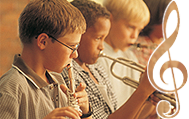Integrating Music With Other Academic Areas
Submitted by Jamie Rozek , Buffalo, New York
Idea posted 2002-01-15
I don't have time to type out lessons at the moment, but I will give you some ideas on what I have done to integrate with other academic areas.
I think as music educators, this should become one of our prime focuses outside of teaching music. Integrating disciplines is one of the best arguments for keeping Music Education in the schools.
The third graders were working on a unit about creativity in music. At the end of the unit, they had a special assessment. We listened to the first two verses of a ballad called "Don Gato." If you know this song, you know that the first two verses don't hold a great deal of information to the rest of the story. So, they listened to this, and we discussed the story so far. Their assignment was to go home over the weekend and finish the story of Don Gato, writing at least two paragraphs.
This assignment did a great many things for them: 1. They had to read and analyze a piece of music as a literary work. 2. They had to think outside the box, given very few parameters. 3. They had to apply their language arts lessons, as I was adamant about proper grammar and sentence structure.
Of course, at first, they groaned about this. However, by the next class, they were extremely excited... They had their own story. After I had them all turned in, we listened to the rest of the song. They were amazed to hear how different or how alike to the remainder of the story their stories were. A great discussion came out of it. This is a lesson I have enjoyed doing.
Another activity that involved writing was a rap. We were studying rhythm and beat, and began studying rap music. What is great about rap music is that it has that steady beat that you can REALLY feel, while the rhythm is spoken. It really lays it out for them, and they understand the difference between the two so much better.
We have three third grade classes. Each one of them came up with their own rap. It was a democratic decision. A few students offered suggestions on a topic, and the rest of the class voted on the topics suggested. After that, we discussed rhyming and its importance to rap. We discussed syllables, and they figured out how to fit the different lines of the verses into a syllable structure. It was incredible how they all worked that out together. The greatest part for them was performing it for themselves. When they heard how it sounded with a rap track behind it, they were extremely excited.
Here's what they got out of this activity: 1. Understood the difference between beat and rhythm. 2. Learned about rhyming words and their importance to music. 3. National Standards: Singing alone and with others a wide repertoire of music. 4. Composing and improvising. 5. Grammar was also reinforced. (Does this sound right? How can we make it sound better?)
These are two great lessons where they were very much engaged. I would suggest it. When you discuss rhythm and time signatures, math can be brought into the picture. Time signatures are merely fractions. With rhythm, you can do multiplication, division, and addition. I like to use money to discuss note values. With older grades, instead of money I use the division aspect. I always start at the top, with the whole note and work my way down.
Almost EVERY lesson you do can be incorporated with another subject. Just about eveything I do has some sort of history lesson in it. The Internet has been an invaluable resource for this.
I hope this helps out!
